|
COVID-19 Emergency Response Information
Stay Healthy. Get Vaccinated.
Text your zipcode to 438829 (GETVAX) or 822862 (VACUNA)
Visit vaccines.gov or Call 1-800-232-0233
For help getting vaccinated, contact Disability Information and Access Line (DIAL): [email protected] or 888-677-1199
Learn how you can use Prepared4ALL at
AUCD's National Center on Disability in Public Health
Public Health is for Everyone Toolkit Updates: COVID-19 Resources!
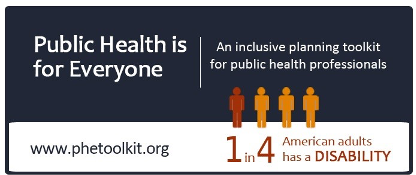 The Public Health is for Everyone Toolkit is a one-stop collection of resources on health and disability. The online toolkit serves to increase the capacity of public health professionals to create programs that benefit entire communities, including people who have disabilities. The Public Health is for Everyone Toolkit provides resources to enhance planning efforts in key issue areas such as emergency preparedness, nutrition, obesity, health care access, accessibility, and more. The Public Health is for Everyone Toolkit is a one-stop collection of resources on health and disability. The online toolkit serves to increase the capacity of public health professionals to create programs that benefit entire communities, including people who have disabilities. The Public Health is for Everyone Toolkit provides resources to enhance planning efforts in key issue areas such as emergency preparedness, nutrition, obesity, health care access, accessibility, and more.
Visit the COVID-19 issue area of the PHEtoolkit.org to see all the newly added resources for current information and strategies for support and coping with social distancing! You can also submit resources to be included in the toolkit here!
AUCD News & Events
AUCD's 12 Children's Mental Health Champions Complete Their Projects for the 2020-2021 Year

In 2020, the Association of University Centers on Disabilities (AUCD) expanded its National Center on Disability in Public Health efforts with the launch of a new pilot program, Children's Mental Health Champions. This effort was made possible through a cooperative agreement with the Centers for Disease Control and Prevention (CDC). Twelve Champions were selected, representing American Samoa, California, Colorado, Connecticut, Georgia, Kentucky, Maine, New Mexico, North Carolina, South Dakota, and Virginia, to serve as liaisons to the CDC's Children's Mental Health project in 2020-2021.
Learn about each of the Champions and their respective projects during the 2020-2021 cohort.
AUCD 2021 - Learning Together: Connecting Research and Lived Experience
Register by October 22, 2021

The 2021 AUCD Conference will take place online November 15-17. The theme of this year's conference is "Learning Together: Connecting Research and Lived Experience." AUCD2021 will continue to serve as a forum for meaningful collaborations around important topics, best practices, and issues that affect the disability community, the AUCD network, and beyond. AUCD is also excited to continue 50th anniversary celebrations during the virtual conference.
The conference will include virtual plenary sessions, pre and post-conference meetings with special interest group members, and poster presentations all offering the opportunity to engage with and reach out to a vast network of community leaders, researchers, policymakers, practitioners, professionals, advocates, and students.
Learn more about this year's conference and register today!
State and Territorial Act Early/COVID-19 Response Teams Receive a Second Year of Funding to Support Early Childhood Systems

State and Territorial Act Early/COVID-19 Response Teams have been awarded a second year of funding for the grant opportunity for Support for Early Childhood State Systems through the Act Early Network. This second year, beginning 9/1/2021, has been made possible by an infusion of funding to support an Act Early Network-wide response to COVID-19 through a cooperative agreement with the Centers for Disease Control and Prevention (CDC) and the Association of University Centers on Disabilities (AUCD). 42 Act Early Ambassador-led/co-led Response Teams will receive $94,000 each to provide support to families with young children across the country by bolstering collaboration among early childhood programs and systems to improve the four "steps" of early identification of developmental delays and disabilities (parent-engaged developmental monitoring using LTSAE, developmental screening, referral for early intervention services, and receipt of early intervention services), including autism, and working to improve resiliency skills and behaviors among families. Response Teams will also use this additional year of funding to continue to develop, implement, and evaluate strategies to improve the four "steps" of early identification of developmental delays and disabilities (using "Learn the Signs. Act Early." (LTSAE)/early identification messaging, materials, resources, and tools) within early childhood programs and systems, support families in transitioning from step to step to reduce loss to follow up and support family, child, provider, and/or community resiliency especially within communities disproportionally affected by COVID-19 and/or COVID-19 mitigation efforts.
Learn about Act Early Response to COVID-19 and each of the state teams.
Access to Healthcare
What is Health Care Transition? HCT 101
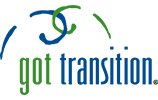 Got Transition is excited to share their new animated video, What is Health Care Transition? HCT 101. The video provides an overview of transitioning to an adult model of care, including self-care management, changes at 18, and transferring from a pediatrician to an adult provider. The video was created in close collaboration with young adults from Wisconsin's PATCH program, a true "for youth and young adults, by youth and young adults" project. Got Transition is excited to share their new animated video, What is Health Care Transition? HCT 101. The video provides an overview of transitioning to an adult model of care, including self-care management, changes at 18, and transferring from a pediatrician to an adult provider. The video was created in close collaboration with young adults from Wisconsin's PATCH program, a true "for youth and young adults, by youth and young adults" project.
Got Transition aims to help youth and young adults move from pediatric to adult health care. Learn more about their work and watch their new animated video!
ECHO Training Series: Caring for Adults with Intellectual and Developmental Disabilities (IDD) during Pandemics and Emergencies

The Center for Leadership in Disability (CLD) at Georgia State University, in partnership with Adult Disability Medical Healthcare, Inc. (ADMH), has received a $50,000 grant from the WITH Foundation to develop and implement a series of web-based trainings for primary care providers (PCPs) using the established Extension of Community Health Outcomes (ECHO®) model of training delivery. The training will educate PCPs on best practices for providing accessible, responsive, and culturally competent care to individuals with intellectual and developmental disabilities (IDD) during pandemics and similar emergencies.
The training developed and administered by CLD and ADMH will include 8 modules and will be offered weekly from September 22nd through November 11th, 2021. Continuing Medical Education (CME) units will be offered to eligible attendees at no cost to participants. Following this training, the project team anticipates adapting and scaling the modules so that they are appropriate and informative for other key populations who care for individuals with IDD, including clinic staff, nurses, social workers, and direct support professionals.
Learn more about this upcoming 8-session virtual training series and register today!
National Association of County and City Health Officials (NACCHO): Health and Disability Fellowship Opportunity
Applications Due by October 1, 2021
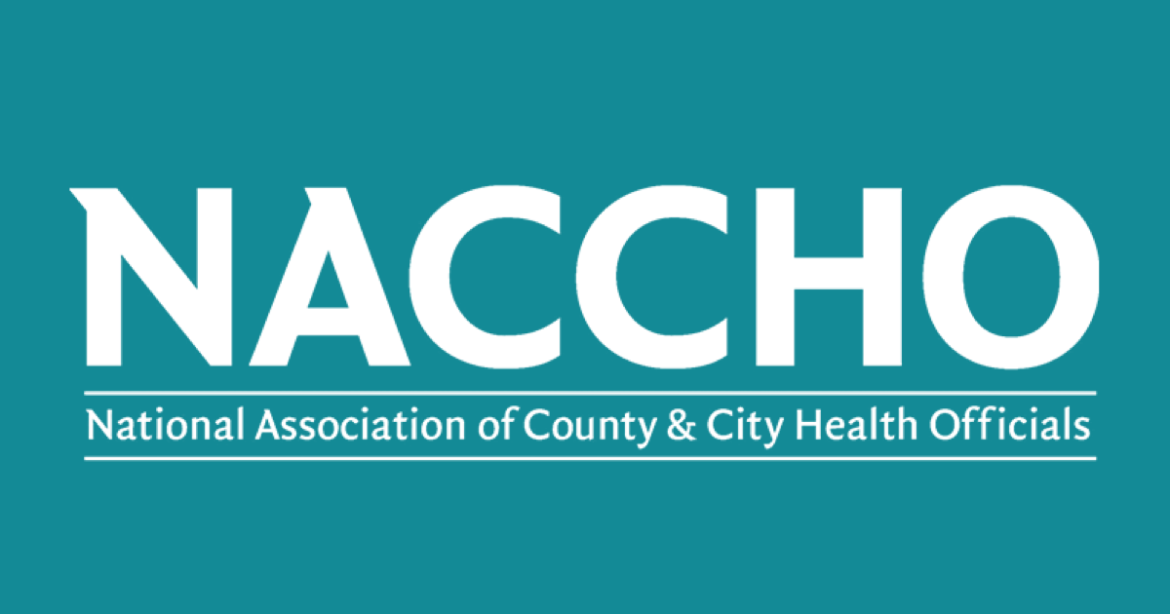 The National Association of County and City Health Officials (NACCHO) is recruiting two graduate students to join the 2021-2022 Health and Disability Fellowship Program. This program offers an invaluable workforce development opportunity for graduate students seeking hands-on experience in the public health disability field. NACCHO trains the fellows to become leaders in promoting the health of people with disabilities through inclusive programming, products, and services. The National Association of County and City Health Officials (NACCHO) is recruiting two graduate students to join the 2021-2022 Health and Disability Fellowship Program. This program offers an invaluable workforce development opportunity for graduate students seeking hands-on experience in the public health disability field. NACCHO trains the fellows to become leaders in promoting the health of people with disabilities through inclusive programming, products, and services.
This is a part-time paid fellowship ($18/hour) slated to start in October 2021 and run through July 29th, 2022. The fellowship includes travel expenses and conference registration to at least one conference or meeting. ASL interpreter, captioning services, or other accommodations are available upon request. This position is fully remote with the fellows working from their graduate school location.
Applications will be reviewed through October 1, 2021. Learn more and apply. For questions about the fellowship, contact Sara Lyons at [email protected].
Developmental Monitoring
Hands in Autism® Early Childhood Development 3-Day Training
October 6th-8th 8:00am - 4:00pm EST
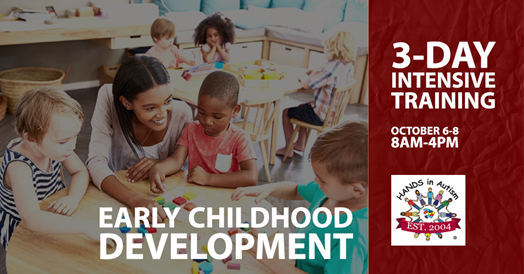 Join the HANDS in Autism® Team for an intensive training focused on innovative, interactive experiences and coaching in a virtual early childhood classroom. Youth on the spectrum are active participants across the training days facilitating a rich learning environment for all. Join the HANDS in Autism® Team for an intensive training focused on innovative, interactive experiences and coaching in a virtual early childhood classroom. Youth on the spectrum are active participants across the training days facilitating a rich learning environment for all.
Training days consist of a combination of independent and group learning opportunities enhanced by the simulated and live practice of skills and strategies allowing for ongoing modeling, coaching, feedback, and mentoring from HANDS trainers. With an emphasis on building increased knowledge and skill in the process of making appropriate programming decisions for each student, classroom, and/or intervention team, training topics build successively across each day using the HANDS in Autism® Model Training Curriculum, Framework, and Process.
Learn more about this training opportunity and register today!
What good was his diagnosis anyway? Understanding an FASD Diagnosis
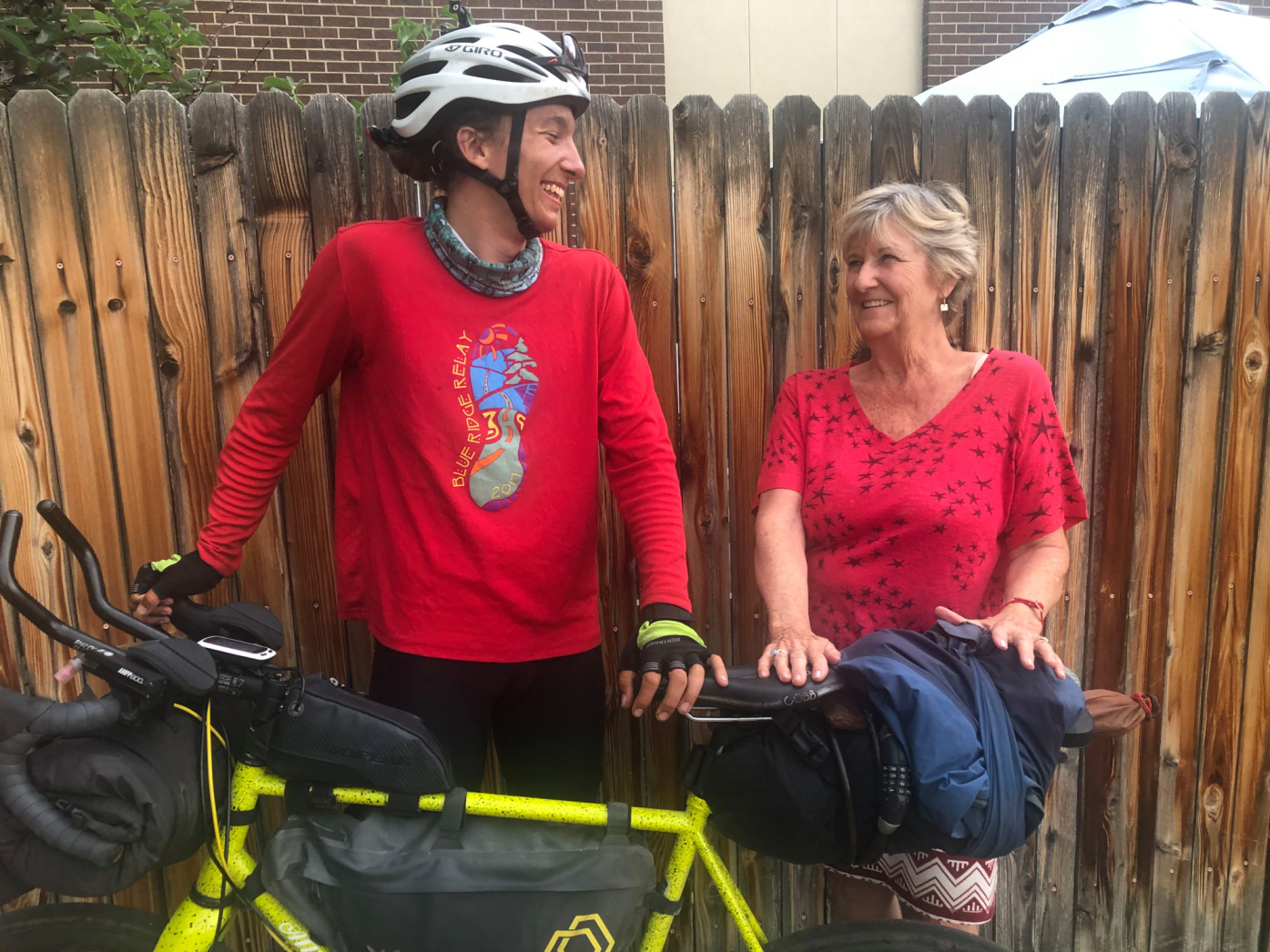 "Early diagnosis is very important. Ensuring access to quality and affordable diagnostic services can support families in receiving additional services and support. Getting a diagnosis of a FASD for yourself, your child, or a loved one can result in additional support to thrive into adulthood, like developmental disability services or educational services." This personal story tells the importance of a diagnosis and how it helped a family to become Fetal Alcohol Spectrum Disorders (FASD) aware. "Early diagnosis is very important. Ensuring access to quality and affordable diagnostic services can support families in receiving additional services and support. Getting a diagnosis of a FASD for yourself, your child, or a loved one can result in additional support to thrive into adulthood, like developmental disability services or educational services." This personal story tells the importance of a diagnosis and how it helped a family to become Fetal Alcohol Spectrum Disorders (FASD) aware.
Continue reading the full article and learn about six reasons to get an FASD diagnosis.
Evaluation of the Feasibility and Perceived Value of Integrating "Learn the Signs. Act Early." Developmental Monitoring Resources in Early Head Start
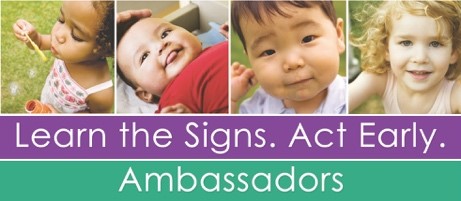 Many children with developmental disabilities are not identified before age 3 years of age, preventing them from being able to fully benefit from early intervention services. Early childhood educators, particularly those in Early Head Start (EHS) programs, are important partners in the early identification of children with developmental delays. "Learn the Signs. Act Early." (LTSAE) is a program of the U.S. Centers for Disease Control and Prevention that provides free developmental monitoring resources to increase the early identification of children with developmental delays and disabilities. This paper presents findings from the first evaluation of the use of LTSAE resources in EHS, which was conducted across four states and 11 EHS programs from fall 2018 through spring 2019. Surveys and interviews with EHS management, staff, and parents indicated that LTSAE resources were valued and accepted, and their use in EHS considered feasible. Importantly, families and staff reported the LTSAE materials provided shared language to help them more effectively discuss development. These findings inform EHS and other early education programs that wish to enhance developmental monitoring, screening, and referral. Many children with developmental disabilities are not identified before age 3 years of age, preventing them from being able to fully benefit from early intervention services. Early childhood educators, particularly those in Early Head Start (EHS) programs, are important partners in the early identification of children with developmental delays. "Learn the Signs. Act Early." (LTSAE) is a program of the U.S. Centers for Disease Control and Prevention that provides free developmental monitoring resources to increase the early identification of children with developmental delays and disabilities. This paper presents findings from the first evaluation of the use of LTSAE resources in EHS, which was conducted across four states and 11 EHS programs from fall 2018 through spring 2019. Surveys and interviews with EHS management, staff, and parents indicated that LTSAE resources were valued and accepted, and their use in EHS considered feasible. Importantly, families and staff reported the LTSAE materials provided shared language to help them more effectively discuss development. These findings inform EHS and other early education programs that wish to enhance developmental monitoring, screening, and referral.
Continue reading the full article and learn about the findings of this study and the EHS and early education programs.
Emergency Preparedness
New Association of State and Territorial Health Officials (ASTHO) Emergency Preparedness and Disability Resources
 As part of a CDC-funded project, ASTHO provided full-time disability and preparedness specialists to 14 jurisdictions to better plan for and respond to the needs of people with disabilities during emergencies. Learn more about the specialists, their work, and important considerations for inclusion of people living with disabilities in emergency preparedness through the following resources: As part of a CDC-funded project, ASTHO provided full-time disability and preparedness specialists to 14 jurisdictions to better plan for and respond to the needs of people with disabilities during emergencies. Learn more about the specialists, their work, and important considerations for inclusion of people living with disabilities in emergency preparedness through the following resources:
Nutrition and Healthy Weight
Move United: Program Service Intern
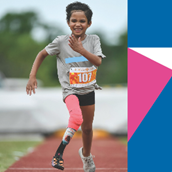 Join the movement! Move United is seeking interns for this fall (September-December 2021) and the winter (January-May 2022). An internship with Move United provides the opportunity to gain knowledge and professional experience in adaptive sports, sports management, events management, and other related fields while helping Move United lead a movement so that no one is left on the sidelines and everyone gets in the game. Program Services Interns will learn about project management, event management, and planning, as well as non-profit operations and organizing programs for individuals with disabilities. The internship involves traveling to and supporting a wide variety of events and program logistics. Join the movement! Move United is seeking interns for this fall (September-December 2021) and the winter (January-May 2022). An internship with Move United provides the opportunity to gain knowledge and professional experience in adaptive sports, sports management, events management, and other related fields while helping Move United lead a movement so that no one is left on the sidelines and everyone gets in the game. Program Services Interns will learn about project management, event management, and planning, as well as non-profit operations and organizing programs for individuals with disabilities. The internship involves traveling to and supporting a wide variety of events and program logistics.
Learn more about position and apply today!
Sexual and Reproductive Health
Supporting LGBTQ+ People with Intellectual and Developmental Disabilities
 "LGBTQ+ people with intellectual and developmental disabilities (IDD), deserve to be accepted and supported for who they are. LGBTQ+ people and people with disabilities are both much more likely to be bullied or discriminated against. Many family members and professionals do not understand or accept when a person with IDD is LGBTQ+. LGBTQ+ people with IDD are sometimes not allowed to express their gender or sexuality, which can make them feel lonely and ashamed. It is important to support LGBTQ+ with IDD so they can express who they are and live happy lives." "LGBTQ+ people with intellectual and developmental disabilities (IDD), deserve to be accepted and supported for who they are. LGBTQ+ people and people with disabilities are both much more likely to be bullied or discriminated against. Many family members and professionals do not understand or accept when a person with IDD is LGBTQ+. LGBTQ+ people with IDD are sometimes not allowed to express their gender or sexuality, which can make them feel lonely and ashamed. It is important to support LGBTQ+ with IDD so they can express who they are and live happy lives."
Read the full article and learn more about LGBTQ+ identities.
Wellness and Mental Health
Hands in Autism® Virtual Learning & Socialization Opportunities for Individuals with Autism Spectrum Disorders
 Does your child or student with Autism Spectrum Disorders (ASD) need to develop executive skills, plan for and practice daily routines, or learn about community opportunities related to employment, leisure, and socialization? HANDS in Autism® is offering various virtual group sessions (small, multi-day, and large group community connections) to meet the needs (and schedule) of your child/student. Learn more about the information about topics and view the fall schedule. Does your child or student with Autism Spectrum Disorders (ASD) need to develop executive skills, plan for and practice daily routines, or learn about community opportunities related to employment, leisure, and socialization? HANDS in Autism® is offering various virtual group sessions (small, multi-day, and large group community connections) to meet the needs (and schedule) of your child/student. Learn more about the information about topics and view the fall schedule.
Other Resources
New: National Hispanic Heritage Month 2021 HHS Fact Sheet
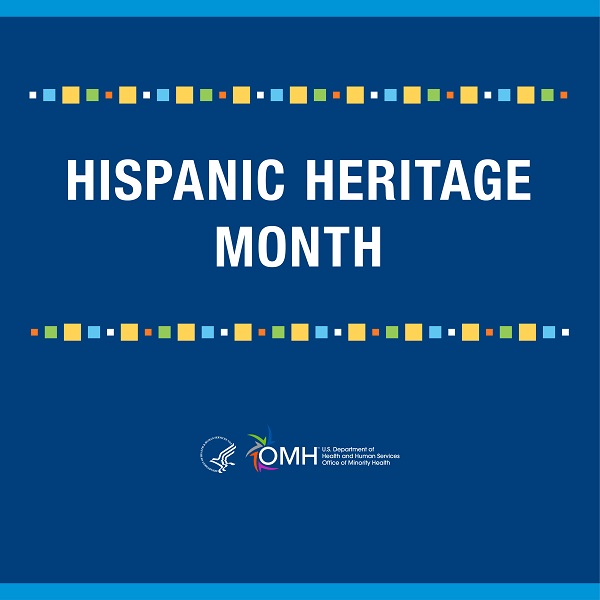 Looking for information about Latino populations? Start your search with the National Hispanic Heritage Month 2021 HHS Fact Sheet, published by the U.S. Department of Health and Human Services (HHS) with support from the HHS Office of Minority Health (OMH). This brief fact sheet provides up-to-date statistics on important health issues and links to additional resources from agencies throughout HHS. Click here to read and download the fact sheet. Looking for information about Latino populations? Start your search with the National Hispanic Heritage Month 2021 HHS Fact Sheet, published by the U.S. Department of Health and Human Services (HHS) with support from the HHS Office of Minority Health (OMH). This brief fact sheet provides up-to-date statistics on important health issues and links to additional resources from agencies throughout HHS. Click here to read and download the fact sheet.
American Public Health Association (APHA) Disability Section Mentoring Program: Now Recruiting Mentors and Mentees
 The Disability Section Mentoring Program is designed to strengthen the public health workforce and improve the representation of people with disabilities and our allies in leadership. The program provides one-on-one support and guidance for students and early career professionals. The Disability Section Mentoring Program is designed to strengthen the public health workforce and improve the representation of people with disabilities and our allies in leadership. The program provides one-on-one support and guidance for students and early career professionals.
APHA welcomes undergraduates and up who are working, studying, or interested in public health. Those with any type of disability, chronic illness, mental health condition, or who are culturally Deaf are encouraged to apply. You do not have to have a disability or be an APHA member to participate.
Apply to be a mentor, mentee, or both at any time online. Contact [email protected] for more information.
|


